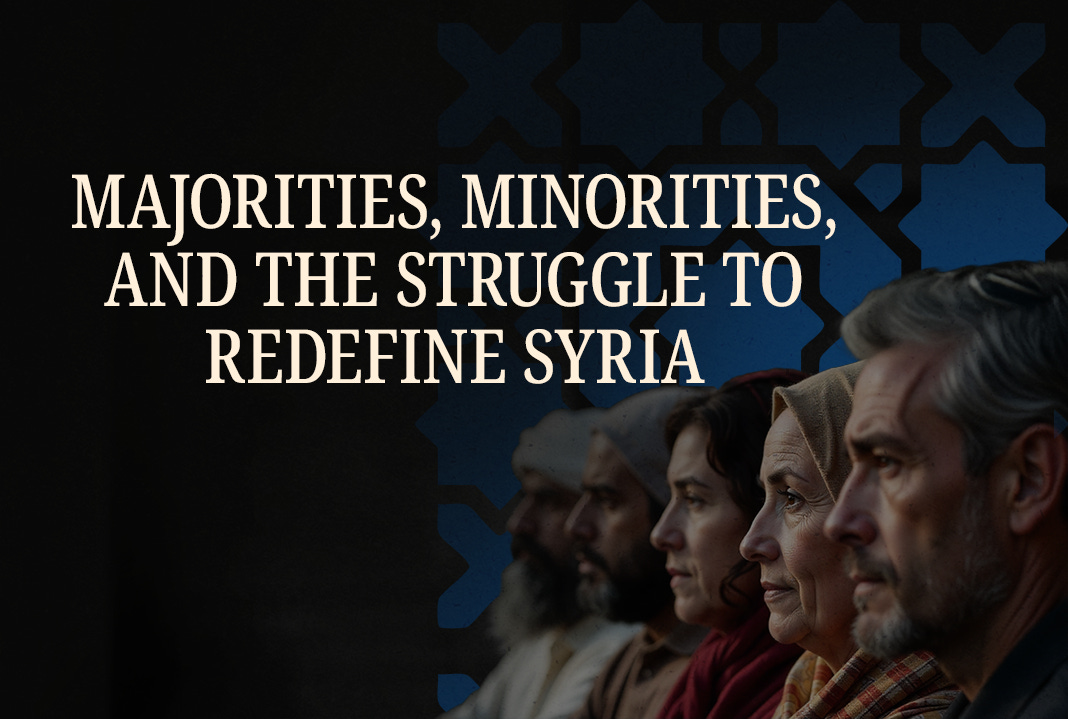Majorities, Minorities, and the Struggle to Redefine Syria
Syria’s diverse communities must move past grievance toward coexistence—and that starts with asking the right questions
When we talk about Syria’s future, the real challenge is not just finding answers but learning to ask the right questions. Too often, the questions we pose point us back toward blame rather than forward toward solutions.
Take, for instance, the common question: why are minorities being demonized? It is not a wrong question, because minorities are indeed being demonized. But framed this way, it implies that the Arab Sunni majority alone bears responsibility, as though they were the only community guilty of such behavior. This ignores both the fifteen years of war and the five decades of authoritarianism that preceded it—a rule often justified, unofficially, as a way to protect minorities. The hard truth is that in Syria, every community has, at different times, demonized the other. The better question is: how do we stop this cycle and begin rebuilding trust?
Another misplaced question is: how could the oppressed suddenly become oppressors? The answer is simple, albeit painful. Revolutions are fueled by covetousness—the desire for power. And when power is finally won, it is often wielded in the same way people experienced it under oppression. Decades of authoritarianism leaves its mark on habits, instincts, and morals alike. People may have read about justice, equality, or fairness, but abstract ideals rarely overcome the lessons of lived experience. That is why the real challenge lies in asking how we can break the cycle of oppression and contain the dark impulse within us that drives us to repeat it.
This is especially urgent when we consider the mindset still prevalent among many Sunnis. Centuries of rule under the Ottomans created an expectation that Sunni values were the norm and that the state’s role was to embody and defend them. Such expectations are fundamentally at odds with modern governance, which must rest on citizenship, equality, and secular principles. Changing this mentality will not be easy, nor quick. It will require a long-term commitment from those within all communities who genuinely believe in citizenship and equality, and it will necessitate the development of practical techniques to counter the pull of old patterns.
Similarly, many in the Alawite community have enjoyed easier access to figures of authority and the limited privileges that come with that proximity over the last few decades. Most, however, remain poor by design. This was the regime’s way of ensuring its continued dependence and of funneling many people into the army and security services.
Still, what little they had came through that relationship with the regime. Now, they find themselves cut off, isolated, and in some cases persecuted—a reality they are not prepared to accept. Christians, Druze, and Ismailis feel a similar grievance. Under the previous regime, their concerns were accommodated, at least superficially, in ways that no longer exist.
Now, all must contend with authority figures drawn primarily from the formerly demonized majority community: Sunni Arabs, in their most feared manifestation—Islamists—who embody precisely the mentality described earlier. This turn of events is not easy to accept or adjust to. Looking to the international community for help is a natural reflex, but given today’s geopolitical realities, little beyond diplomatic gestures is likely. The solution, in the end, has to come from within.
Meanwhile, Syrians must find ways to coexist, cooperate, and reach transitional accommodations with the current authority structures—despite their majoritarian tendencies and Islamist leanings. The pragmatism shown by today’s leadership makes such arrangements possible, but only if we, too, respond with pragmatism of our own.
Transitions after conflict are never about achieving perfection. They are about avoiding the worst: revenge en masse, displacement, confiscations, and arbitrary arrests. By this modest but necessary measure, Syria’s transition, though marred by tragedy in the coastal mountains and in Suweida, and though tensions still run high across the country, remains relatively restrained. This is cold comfort to those who continue to suffer or fear they will. Yet it offers a sober way to measure progress without being trapped by emotion.
Those Syrians who have lost faith in the country and are betting on separatism or broad autonomy are misreading both the regional and international climate, as well as the likely direction of future events. In doing so, they deprive themselves of the real possibility of pursuing more practical alternatives—alternatives capable of attracting both domestic and international support.
Seen in this light, Syria’s transition—uneven, painful, but real—is working. And it merits international support.
Middle East Uncovered is powered by Ideas Beyond Borders. The views expressed in Middle East Uncovered are those of the authors and do not necessarily reflect the views of Ideas Beyond Borders.




I couldn’t agree more with every word said. If i may add something to what you wrote. If we are to take a quick look at the instagram comments of a Syria related event, whether it be the most recent attacks on the Druze, or a new law, or “lone” atrocities committed by a member of the government forces, i think what find is terrifying. The comments are hateful, reeking of sectarianism, racist, to say the least. A part of me is fearful that this is what Syrians have become, or rather what the Sunni majority has become. If there is an election today, I am convinced Al-Jolani would win and that is a scary thought. As Syrians we have never been given a chance to choose, my fear now is, given the choice, we would make it based on revenge for the past 14 years, on sectarianism, and on maintaining the new status quo. And that is where we would all lose and the Assad saga would begin again but with new actors.
ij